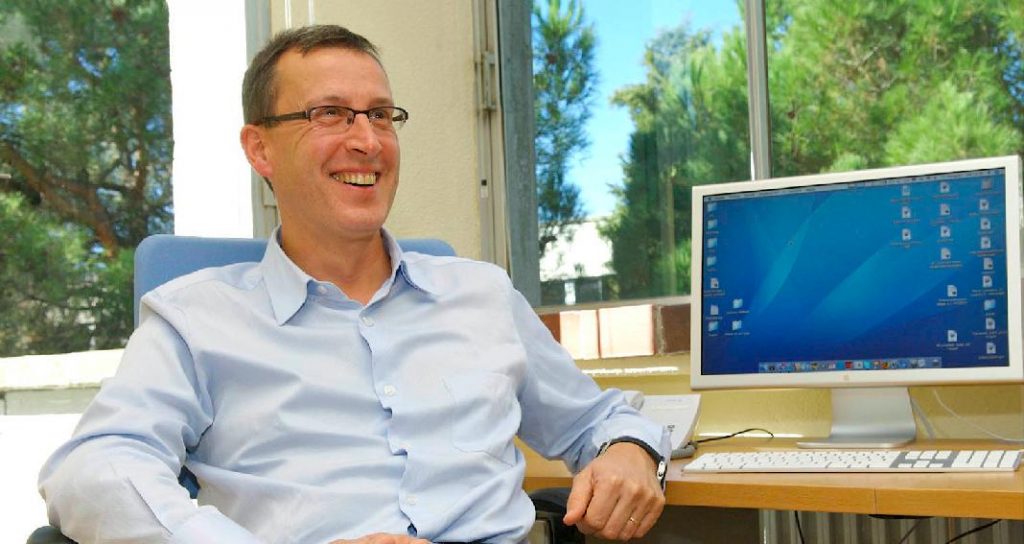 Enrique Zuazua, University mathematics professor, national academic prize winner and professor of Jakiunde, Academia de las Ciencias, de las Artes y de las Letras de Eusko Ikaskuntza (Basque Academy of Science, Arts and Humanities). “The solution to the Basque problem will come by finding the balancing point in which everyone is reasonably satisfied.” At age 28, he was the youngest university professor in the country. He is one of top fifteen national scientists most published in the world. He has taught at 15 international universities. Paradoxically, and in spite of being Basque – he has been in Madrid for 20 years now – he is better known outside the Basque country than within. Problems are afraid of him. That is why he is a mathematician. He has been recognized with the Euskadi Investigation Award (2006) and with the National Prize (2007). His resume fills up seven amazing pages (without counting references to the 231 publications in which he has participated). Enrique Zuazua (Eibar, 46 years old) grants a small truce to his mathematical problems to reflect on other problems, those of his country.
Enrique Zuazua, University mathematics professor, national academic prize winner and professor of Jakiunde, Academia de las Ciencias, de las Artes y de las Letras de Eusko Ikaskuntza (Basque Academy of Science, Arts and Humanities). “The solution to the Basque problem will come by finding the balancing point in which everyone is reasonably satisfied.” At age 28, he was the youngest university professor in the country. He is one of top fifteen national scientists most published in the world. He has taught at 15 international universities. Paradoxically, and in spite of being Basque – he has been in Madrid for 20 years now – he is better known outside the Basque country than within. Problems are afraid of him. That is why he is a mathematician. He has been recognized with the Euskadi Investigation Award (2006) and with the National Prize (2007). His resume fills up seven amazing pages (without counting references to the 231 publications in which he has participated). Enrique Zuazua (Eibar, 46 years old) grants a small truce to his mathematical problems to reflect on other problems, those of his country.
Question.- You maintain that mathematics can explain any phenomenon in nature. Does that include the Basque problem?
Answer.- Mathematics teaches several things. Perhaps the most important is that to solve a problem it is necessary to formulate it well. There is no problem more difficult to solve than that one that is badly formulated. And to formulate it properly, one needs to know who the agents are, what are their motivations, their objectives, their interests and the capacities of each one. One of the great complexities of socio-political problems is to determine what the problem is and who the agents are.
Q.- That is, the problem won’t go away for a while.
A.- People like to have solutions for everything, and that this solution is complete and comes with a fixed date. But things do not work like this. When we read history in books, it is true that they put a date to a discovery, a revolution, or an invention. But we all know that, in practice, these facts are the result of much longer developments. When there are multiple agents, when the scene is complex, the final answer rarely comes in a measurable space of time. It is usually a progressive process, dynamic, that generates highs and lows. We can only aspire to be able to continue kneading the dough that is the complex scene, so that it reaches that place of calm, more harmonic, in which the future will be just a little bit more enriching for all.
Q.- Then, is there no real solution? Only something that looks like a solution?
A.- I do not want to sound pessimistic by saying that problems do not have solutions. What I mean is that the form in which that solution is adopted is not something fixed. It is something more dynamic, changing, and complex.
Looking at it from the outside, I have the feeling that in Euskadi there has been a lot of progress. Cold statistics prove it. That does not mean that it is no longer a great tragedy that there are people who have lost their children, and also people, even though they are living, who cannot see their children because they are very far away, locked up or hidden, that there are people who have to go everywhere with a bodyguard… It is lamentable that a society must exist with all that. It anaesthetizes the common sense of the people. A society that thinks it is normal for people to have a bodyguard necessarily must be an anaesthetized society. When you go to the dentist and he puts your mouth to sleep, later you are unable to taste the flavour of food and unable to appreciate all the pleasure that comes with it. The same thing happens in the social scope: your senses must have been put to sleep if you do not to see the guns underneath the jackets of the bodyguards. In this state, you will be incapable of addressing any problem; problems related to social relations, institutional problems, family related problems, problems related to friendship, to children…
 Q.- You said that the solution to the problem has a direct relation to how the problem is formulated. In Euskadi there are almost as many formulas of the conflict as there are ideologies, and so there is no consensus of what the problem is. Could this be the real problem?
Q.- You said that the solution to the problem has a direct relation to how the problem is formulated. In Euskadi there are almost as many formulas of the conflict as there are ideologies, and so there is no consensus of what the problem is. Could this be the real problem?
A.- In Euskadi, we are used to navel gazing gaze at our navel. We think we are the only ones with these problems. But there are also complex situations in other parts of the world. And it is always the same: if the main agents do not agree on identifying which are the parameters of the problem, it is impossible to find the solution. In Euskadi, it is inevitable, independently of the discussion on the future design, the establishment of short and medium-term policies. While the large parties do not agree on bringing the big problems to the table, other elements that restrain our economic, social and cultural development are not identified. And if there is no consensus on that, it is going to be very difficult to advance any solutions. This is most easily seen in the linguistic field, by the different degree of importance that the political parties give bilingualism. On these kinds of issues, first it is necessary to agree on the level of importance that they have. After this, there will be plenty of time to argue about the political measures to adopt, how it will be transferred to the educative model, to the civil service exams, to business…
Q.- What is your formula of the Basque problem?
A.- I would not dare to suggest a diagnosis, but I see in the various political approaches that have been recently set out, some that to me seem more correct. There can be no complete solution tomorrow. There is no “Yes” or “No” or “Take it or leave it”. There has to be open strategies which can adapt to different scenarios, since the world is changing more and more rapidly. And not only because technology moves forward – change is happening because the agents are also changing. Things that were ignored previously suddenly are becoming important. In Spain, 10 percent of the population are recent immigrants from North Africa, Latin America or Eastern Europe. This is also a reality in Euskadi. It is critical that in this ever changing panorama those political plans have to be open discussions.
Q.- In what way?
A.- Chess is a good metaphor. It is not an aggressive battle, but a polite game, a game of intelligence, in which force is not necessary. The winner is the one who can predict several moves in advance and using this function and analysing all the possible counter moves, makes the best possible decision. The best possible solution, following Nash ́s Game theory, consists in finding the equilibrium point in which everyone is reasonably satisfied. We can see this in action on TV game shows, where you have a chance to win a million Euros, even though you already have won 100,000 Euros. If you answer the next question correctly, you will win the million, but if you fail, you lose everything. Something in our minds says, “Watch out! You can win a bundle, but if you lose, even though it is not so much, you will lose a bundle.” The balance in politics is far from the starting positions of each actor. Think of the million and the 100,000 Euros. The most elaborate scenes, where there is much to lose, appear in politics.
Q.- Does that mean that the parties shouldn’t seek maximalist objectives, but rather try and get as many people as possible satisfied, even though it doesn’t reach as far as many hoped?
A.- Each and every one of us has the right and obligation to aspire and reach for our dreams. To the maximum. I would like to see everyone freely striving for their goals, pursuing their dream, while obviously respecting everyone else. When there are many actors playing, the dreams of each one doesn’t reach the one million Euros, but stays at the one hundred thousand level. Not because they give up, but because the reality is that the prize must be shared among all the actors. This is what we have to aspire to when we face a complex situation. Everyone must try to achieve their maximum, but they have to know that, at the right moment, their goal is unachievable and it is time to make a deal to start again and say: Let’s change the scene like this and start again.
This is not to say that future generations will not have to face the same problems. Reaching a compromise does not mean renouncing your ideals, your dreams, your utopias. It goes on two different planes. One is where I would like to go on vacation, and the other is where can I go with the money I have.
 Q.- On the table is a political proposal of the Lehendakari, the premier of the Basque Country. What do you think of it?
Q.- On the table is a political proposal of the Lehendakari, the premier of the Basque Country. What do you think of it?
A.- I think it proposes the kind of situation which in my opinion leads in the right direction. You have to get politics out of the doldrums where it is, and bring it to a better place where solutions may be easier to reach. You have to open new ways to a political solution, while continue to work day in and day out. This combined recipe will show results. Saying that, you have to be conscious that everything is part of a complicated game in which the final results will be an undefined balancing point between the desires and the efforts of each actor. To reach a solution it appears to me that the political scene should be in motion. The Lehendakari ́s proposal has this virtue. Something has to be done, something has to move. You have to create the future now. You can’t sit back and wait to reach an agreement, or sign some papers, to do something. That can’t be. It’s like asking students not to do anything until they have finished their degrees. A country needs to shake.
Q.- Has the time limit for the Autonomous Communities in the Spanish constitution expired?
A.- There has never been a better health service, better social services, or better infrastructure as when the Autonomous communities in Spain were given power. Self management and cooperation works. What Basque politics does not take into account is that the actual State is in a period of deep change. It is in crisis. Everyone thinks that there is a State and a Europe that have things very clear, and that it is up to the Basque country to make up its mind and have a constructive dialogue with them. What we are missing is that the States of the European Union do not have their minds made up of where they want to go.
Neither the European Union. It seems that constitutional agreements are made just to ignore them. It seems that sometimes transfers of power are agreed, but then never acted on. It seems they want to open new research institutes, but then it is never agreed on. And that is because the central State, between the Autonomous Communities and the increasing power of the European Union, is having doubts.
Q.- What does Independence mean to you?
A.- It is a perfectly legitimate concept. Sometimes it seems to be trivialized when they say that independence is passé, something from the past of nationalism, ethnicity… To me, that is all a great mess. It is like saying to a teenager that he shouldn’t be independent because heis going to see his parents someday on the street, and he will be going to their house for a Christmas party. It is logical that a teenager aspires to be independent. But will he be 100 percent independent? Of course not. There will always be family, the friends, the moments of crisis and moments of celebration. Are we really independent from our parents and from our children? I don’t think so. Can a country be totally independent from other countries? Clearly not. Not even the United States of America is independent. Not even Spain is independent.
Independence is not an outdated concept. It has not fallen into disuse. Every country has the right to aspire to independence, and everyone within this country can make a decision about what they want; to support independence or not. Does this mean that independence will occur someday? Who knows! If the study of nature teaches us anything, it is that processes are always undefined. There is always an up and a down in the search for balance and harmony.
Q.- Moving beyond the concept of independence, is it important for the development of a country today?
A.- Even today? I think so. You don’t have to look any farther than the composition of the European Council, or which countries are represented in the EU. There are big countries, with 80 million people, but there are also countries smaller than the Basque country. These ones, because they are independent, have a seat at the decision table and they can influence the policies on health, research, or infrastructure to maximize the benefits for themselves.
Esta entrevista fue publicada originalmente en el diario Deia en 2007 y reproducida posteriormente por el Europe of the People Institute.

